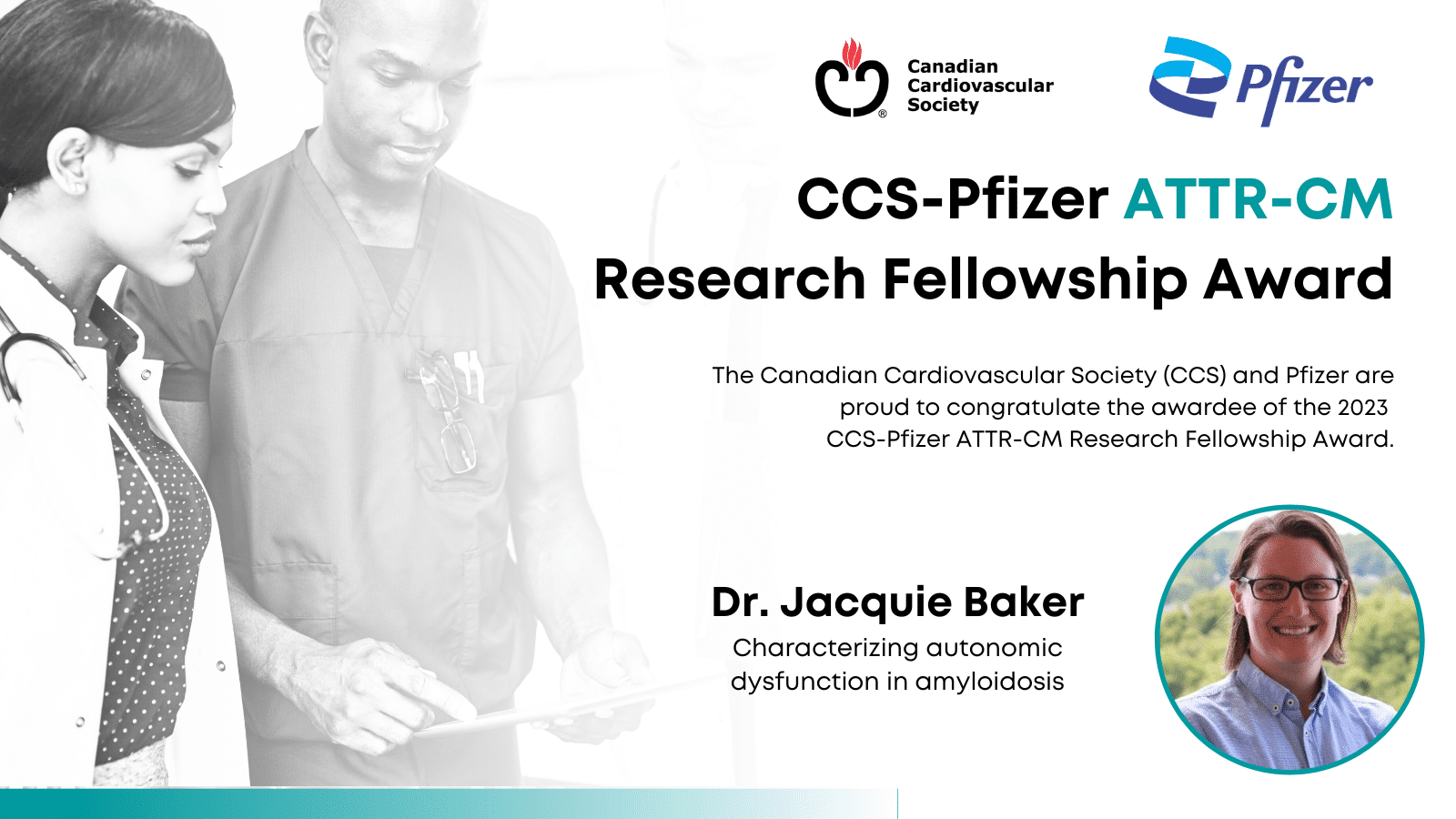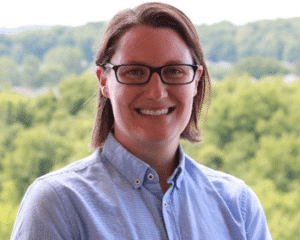
Role of amyloidosis on heart rate and blood pressure the focus of innovative study

Dr. Jacquie Baker, a post-doctoral fellow at the University of Calgary, is the winner of the CCS-Pfizer ATTR-CM (Transthyretin Amyloid Cardiomyopathy) Research Fellowship for her project Characterizing autonomic dysfunction in amyloidosis. Dr. Baker completed a Masters in kinesiology, and a PhD in neuroscience at Western University in London, ON, before moving to the University of Calgary in 2020 under the supervision of cardiologist Dr. Satish Raj. Her work focuses on the autonomic nervous system (the part of the nervous system that controls the body’s automatic functions: breathing, heart rate, blood pressure, digestion) and a rare disease called amyloidosis, which occurs when a protein called amyloid builds up in organs and prevents them from working properly. Specifically, she is looking at the impact of amyloidosis on heart rate and blood pressure.
We sat down with Dr. Baker to learn more about her research and to find out how this fellowship will advance research in the field.
Q: Can you start by telling us what attracted you to this particular area of research?
A: Following my Masters, I started working in an autonomic clinic. This was my first exposure to patients whose autonomic nervous systems fail to work properly. Seeing the real-world impact and implications really changed how I viewed research because it was then that I also started to learn how little work was being done in the area despite how much patients can suffer.
Q: Tell us how this relates to cardiovascular health.
A: My areas of interest fall within the broad spectrum of autonomic nervous system impairment. Within that field, I am particularly interested in disorders that lead to hemodynamic instability – specifically when individuals are upright. For some people, that can mean their heart rates increase excessively when they stand up. For others, it means they can’t properly regulate their blood pressure so it drops dramatically. This can be quite debilitating for people, leading to an inability to work and enjoy daily activities.
Q: How did your project get started?
A: When the CCS/Pfizer scholarship was announced, my supervisor, Dr. Raj, and I reached out to Dr. Nowell Fine, who leads the large amyloid clinic here in Calgary, to see if he would be interested in collaborating to explore gaps in our understanding of autonomic health in patients living with amyloidosis. Fortunately, he was very interested and eager to collaborate.
Q: Can you walk through what your project entails?
A: At the University of Calgary, we run one of the largest autonomic clinics in Western Canada. As part of that we conduct full comprehensive autonomic evaluations. The goals of the project are to characterize and compare autonomic functioning in patients with amyloid light-chain and transthyretin amyloid (hereditary and wild-type transthyretin amyloid). We will recruit 60 patients in three groups of 20. During the one-year study, our goal is to use a battery of tests to provide comprehensive insight into patients with amyloidosis, characterize and compare autonomic function in the different subgroups, and identify which subgroups of amyloid may be susceptible to autonomic dysfunction.
Q: What knowledge gaps will this fill?
A: Recent amyloid care guidelines have highlighted the importance of autonomic function testing, even if patients do not show overt signs and symptoms of autonomic failure. As amyloid patients can often experience a faster deterioration due to autonomic failure, understanding the severity and distribution of autonomic dysfunction associated with amyloidosis is vital to improve timelines to initiate treatment.
Q: How will it advance heart health for communities it targets?
A: The presence of autonomic failure in patients with amyloidosis can lead to significant disease progression, increased cardiovascular risk, reduced survival, and lower quality of life. Therefore, understanding the severity and distribution of autonomic impairments in different sub-types of amyloidosis will really help inform management and treatment that will hopefully reduce cardiovascular risk.
Q: What does this fellowship award mean to you?
A: My research is dedicated to advancing our understanding of cardiovascular autonomic dysfunction and its implications for the cardiovascular health of Canadians. Through the support of the CCS and Pfizer Fellowship, I can further pursue my research interests/goal and continue to establish myself as an emerging leader in the field of clinical cardiovascular autonomic research. Receiving this award also symbolizes recognition of the potential impact of the work we are doing in the field of autonomic nervous system dysfunction in patients with amyloidosis.
Other News
See AllHeart Month: Celebrating Canadian Cardiovascular Research
February 1, 2024
This Heart Month, we’re focusing on the importance of fostering growth of peer-reviewed Canadian...
Heart Month Research Fellowships & AwardsDr. Thomas Roston Wins CCS-BMS Hypertrophic Cardiomyopathy Research Award
November 27, 2023
Dr. Thomas Roston, a cardiologist and clinician-scientist at St. Paul’s Hospital and Vancouver...
HCM Research Fellowships & AwardsGuided Ultrasound Study Aims to Deliver Therapy to Reverse Common Genetic Heart Disease
November 17, 2023
Dr. Brandon Helfield, an Assistant Professor at Concordia University in Montreal, is the winner of a...
HCM Research Fellowships & Awards